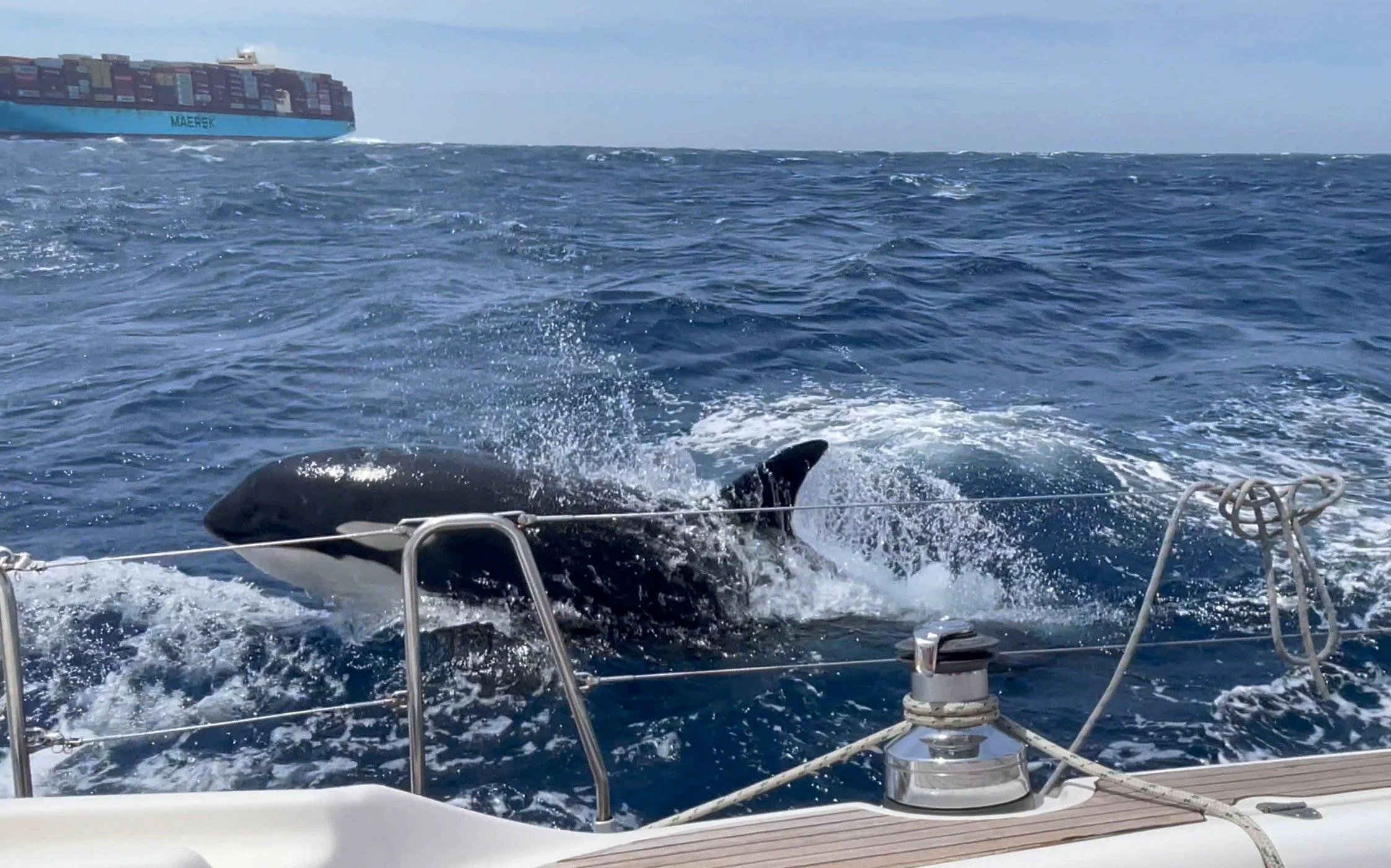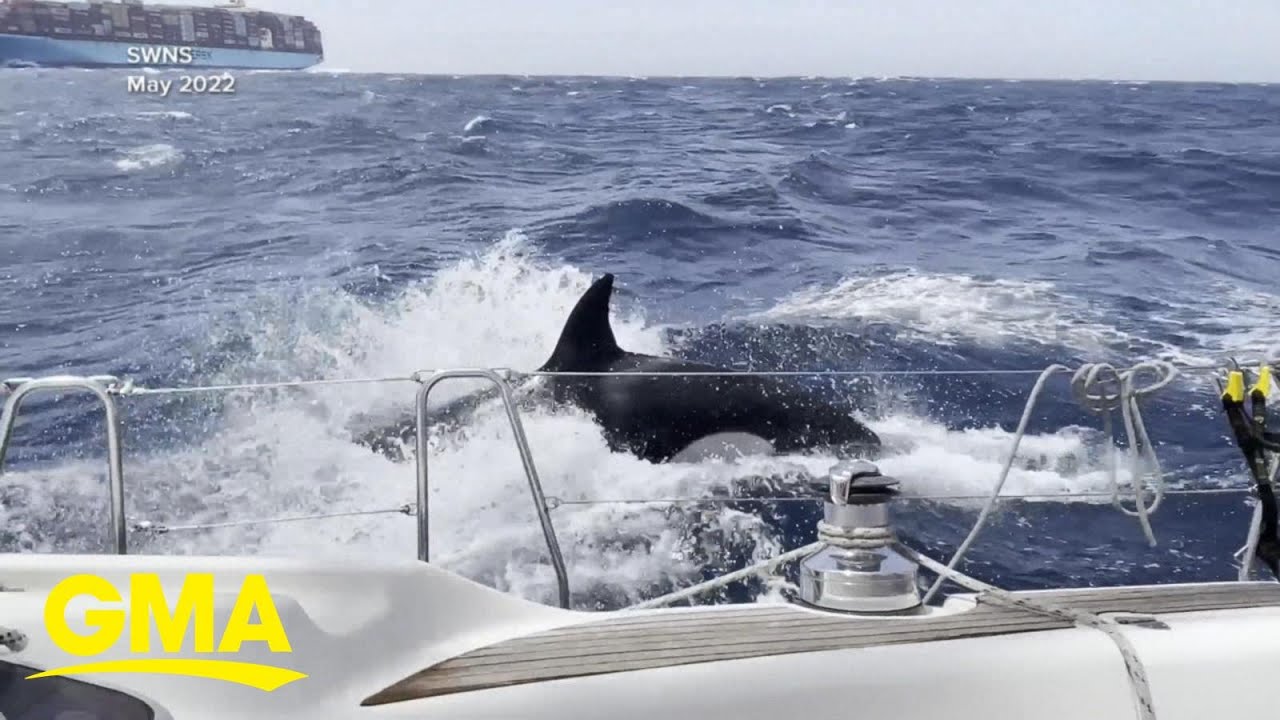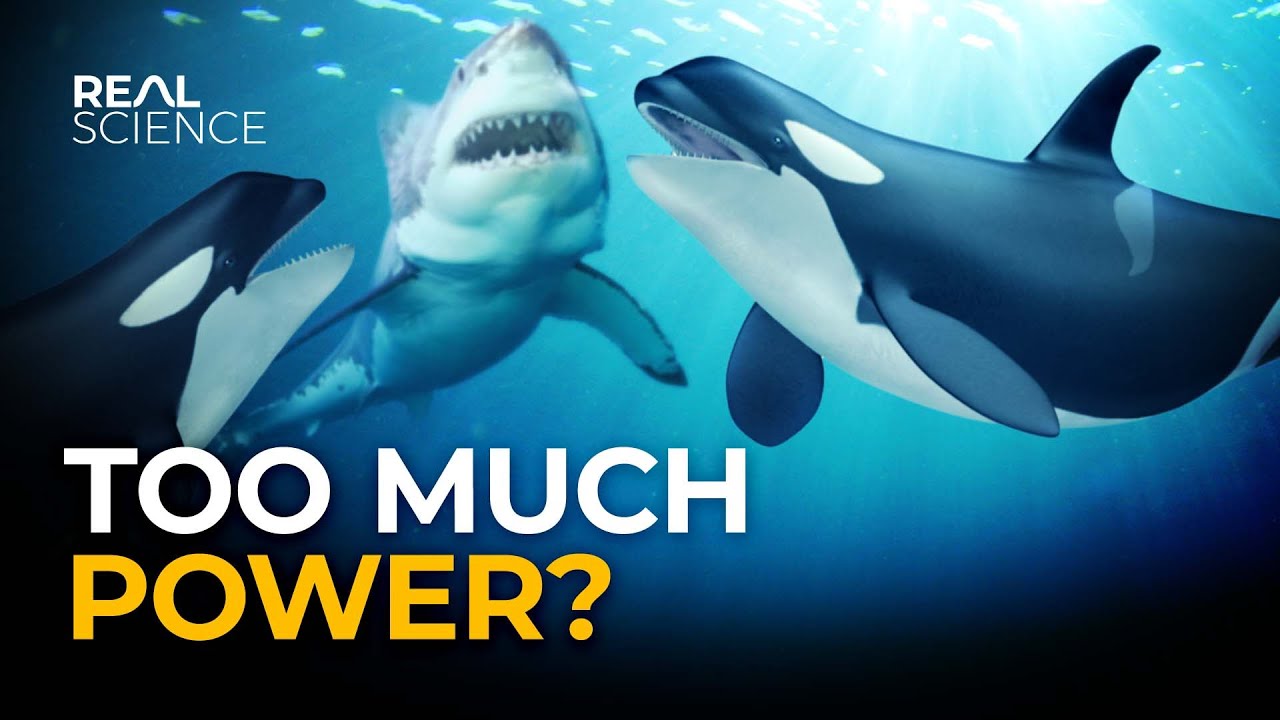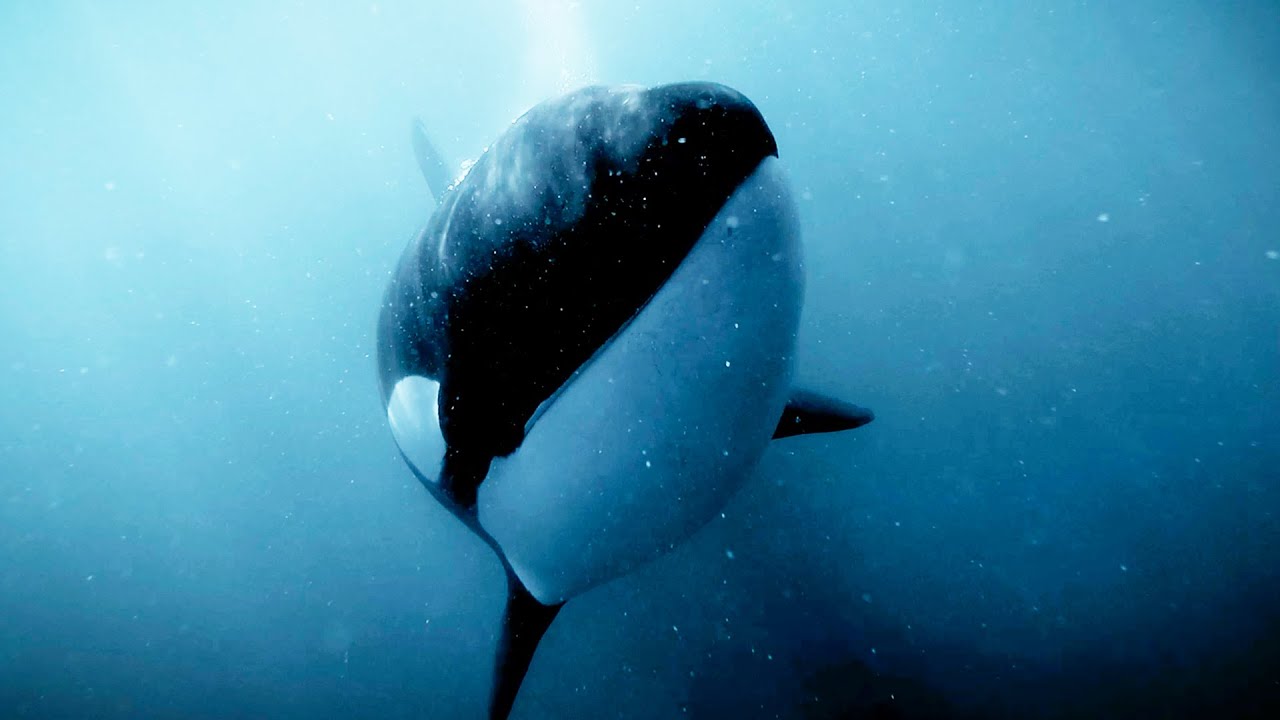Coordinated Orca Attacks Sunk 3 Boats Off European Coast
A series of coordinated orca attacks sunk 3 boats off the coast of Europe has sparked concerns and intense scrutiny over the behavior of these marine mammals. While no casualties have been reported, the incidents have left sailors shaken and boats damaged, heightening concerns about the potential risks and impacts of such encounters.
Author:Maxwell CanvasReviewer:Scarlet SunsetJun 01, 202332.8K Shares620.7K Views

A series of coordinated orca attacks sunk 3 boatsoff the coast of Europe has sparked concerns and intense scrutiny over the behavior of these marine mammals. While no casualties have been reported, the incidents have left sailors shaken and boats damaged, heightening concerns about the potential risks and impacts of such encounters.
Series Of Coordinated Orca Attacks Sunk 3 Boats On European Coast
Observers suggest that the orcas may be teaching one another to attack boats, leading to a rise in these aggressive encounters. Scientists are investigating the cause of this behavior, with one theory suggesting that a traumatized female orca named "White Gladis" may have triggered the aggressive switch, which other orcas have learned to imitate.
Growing Number Of Incidents
The escalation in aggression between orcas and boats has been observed since 2020. Sailors have reported at least 15 human-orca incidents in that year alone, with many of the attacks involving biting or striking the rudders of sailboats. However, it is important to note that the majority of these encounters have been harmless, with only a small percentage resulting in damage to the vessels.

3 boats sunk after apparent coordinated orca attacks
Possible Motivation And Learning Abilities
Researchers have been trying to understand the motivation behind these attacks. Some scientists believe that the orcas may be intentionally causing damage to sailing vessels, while others are more skeptical, suggesting that the behavior may not necessarily be aggressive in nature.
Monika Wieland Shields, the director of the Orca Behavior Institute, emphasizes that it is challenging to determine the exact motivation behind the attacks. She suggests that while the incidents cause damage, the whales' intentions may not be inherently aggressive.
A study published in Biological Conservation highlights the sophisticated learning abilities of orcas, with imitation being a significant factor. This finding supports the theory that the observed behavior may be a result of social learning, where orcas imitate the actions of others within their pod.
Researchers are exploring the possibility that the traumatic experience of White Gladis, possibly a boat collision, triggered a behavioral switch that was then learned and imitated by other orcas.
Response And Warnings
Following the increased number of encounters between orcas and boats, the Portugal National Maritime Authority issued a statement in November 2020, alerting sailors to the "curious behavior" of juvenile killer whales.
The statement warned sailors about the orcas' attraction to rudders and propellers and their potential attempts to approach boats. However, the recent incidents involving the sinking of vessels have heightened concerns among sailors and marine experts.
Orcas Complex Behaviors And The Misunderstood 'Killer Whale' Moniker
Orcas, also known as killer whales, are captivating marine creatures that have captured the imagination of people worldwide. Their striking appearance, intelligence, and social structures make them a subject of fascination and scientific study.
Despite their iconic name, orcas are not inherently harmful animals. In this article, we will delve into the complex behaviors exhibited by orcas and explore the reasons behind their misleading moniker.
The Majesty Of Orcas
Orcas belong to the dolphin family and are the largest members of this group. Here are some key aspects that contribute to their majestic nature:
Size and Appearance
- Adult orcas can reach lengths of up to 30 feet and weigh several tons.
- Their distinct black-and-white coloration, sleek bodies, and large dorsal fins make them visually striking.
Intelligence and Social Structure
- Orcas have one of the most advanced brains among marine mammals, possessing complex cognitive abilities.
- They live in tight-knit matrilineal pods, consisting of multiple generations of related individuals.
- Within these pods, orcas exhibit sophisticated communication and social behaviors, including intricate vocalizations and cooperative hunting strategies.
Misunderstood Moniker
The term "killer whale" can be misleading, as it evokes images of ruthless predators. However, the name originated from their behavior of preying on other marine mammals, not humans. Here are the factors contributing to this misleading moniker:
Feeding Habits and Predatory Behavior
- Orcas are apex predators, with a diverse diet that includes fish, squid, seals, and even other whale species.
- They have been observed employing unique hunting techniques, such as coordinated teamwork to create waves and wash prey off ice floes.
- Instances of orcas hunting marine mammals may have led to their historical association with the term "killer."
Cultural Significance and Historical Context
- Indigenous cultures have revered orcas for centuries, recognizing their intelligence, strength, and symbolism.
- The term "killer whale" likely arose from early mariners who witnessed orcas hunting and interpreted their behavior through a lens of fear and misunderstanding.
Complex Behaviors Of Orcas
Orcas exhibit a wide range of behaviors, showcasing their adaptability and intelligence. Understanding these behaviors helps dispel misconceptions and highlights their intricate nature:
Social Bonding and Communication
- Orcas form strong bonds within their pods, displaying familial and cooperative behaviors.
- They communicate through a combination of clicks, whistles, and vocalizations, enabling them to coordinate actions and share information.
Playfulness and Curiosity
- Orcas are known for their playful nature, engaging in behaviors such as breaching, spyhopping, and tail-slapping.
- They have been observed approaching boats and interacting with humans, demonstrating their curiosity and interest in their surroundings.
Cultural Transmission
- Orcas exhibit cultural learning, passing down knowledge and behaviors from one generation to the next.
- This includes distinct dialects, hunting techniques, and even regional preferences for specific prey.
Orcas, often labeled as killer whales, possess a complex set of behaviors that reflect their intelligence, adaptability, and social nature. Their majestic appearance and intricate social structures contribute to their allure.
By unraveling the true nature of orcas and understanding their behaviors, we can foster a deeper appreciation for these remarkable creatures and their conservation.

The Insane Biology of: The Orca
Orcas And Their Complex Relationship With Aggressive Behavior
Orcas, also known as killer whales, have long been associated with their predatory nature and aggressive behavior. However, understanding the complexity of orcas and their relationship with aggression requires a closer examination of the factors at play.
Predatory Nature And Hunting Strategies
Orcas are apex predators, and their predatory behavior is driven by their need for sustenance. They have been observed hunting a variety of prey, including fish, seals, and even other whale species.
Their hunting strategies often involve coordinated teamwork and strategic planning within their pod. While these hunting behaviors may seem aggressive, it is important to recognize that they are essential for their survival and for maintaining a balanced marine ecosystem.
Social Hierarchy And Intraspecific Aggression
Within orca pods, a complex social hierarchy exists, with individuals occupying different roles and positions. In some cases, aggression can arise as a result of social dynamics within the pod.
Dominance displays, such as jaw clapping and pectoral slapping, may occur during interactions between individuals, particularly when establishing or maintaining social order. These displays of aggression serve as a means of communication and establishing boundaries within the pod.
Environmental Factors And Stress
Environmental factors can also play a role in influencing the aggression levels of orcas. Changes in habitat conditions, food availability, or human activities can lead to increased stress levels among orcas, potentially resulting in more aggressive behaviors.
It is crucial to consider the impact of external factors on their behavior and to promote responsible marine practices to minimize stressors and mitigate potential conflicts.

Orcas Kill, But Not Just for Food | Bad Natured | BBC Earth
Contextualizing Aggression And Human Interactions
While orcas are powerful marine creatures, it is important to note that the vast majority of interactions between orcas and humans occur without aggression. Instances of orcas harming humans are exceedingly rare.
Orcas have not historically displayed direct aggression towards humans, even when subjected to hunting or captivity in the past. It is essential to understand that any aggressive behavior displayed by orcas toward humans is often a response to specific circumstances and should not be generalized as inherent aggression toward our species.
A Multifaceted Understanding
To truly comprehend the complex relationship between orcas and aggression, it is necessary to consider various factors, including their natural behaviors, social dynamics, environmental influences, and the context in which aggression may occur.
It is crucial to approach the topic with an open mind and an understanding that the term "killer whale" does not accurately encompass the full scope of their behavior and interactions.
Overall, orcas exhibit a wide range of behaviors, including aggression, which must be understood within the context of their natural instincts, social structures, and environmental influences.
By delving into the complexities of orcas and their relationship with aggression, we can gain more understanding of these magnificent creatures and promote their conservation and coexistence with humans in marine environments.
People Also Ask
Are There Any Documented Cases Of Orcas Intentionally Targeting Humans?
No, there have been no documented cases of orcas intentionally targeting humans. While there have been rare instances of orcas causing harm to humans, these incidents are typically attributed to misunderstandings or unintended interactions rather than intentional aggression.
Can Aggressive Behavior In Orcas Be Attributed To Captivity?
Aggressive behavior in orcas can occur in captivity, but it is important to note that not all captive orcas display aggressive tendencies. The stressors associated with captivity, such as confined spaces and social disruption, can potentially contribute to increased aggression levels in some individuals.
Do Orcas Display Aggression Towards Other Members Of Their Own Pod?
Orcas do display aggression towards other members of their own pod at times. Intraspecific aggression can occur as individuals establish and maintain social hierarchies within the pod. Dominance displays and confrontations may take place but are usually part of normal social dynamics.
Are There Any Efforts Being Made To Mitigate Conflicts Between Orcas And Human Activities?
Yes, there are ongoing efforts to mitigate conflicts between orcas and human activities. These efforts include implementing guidelines for responsible whale-watching practices, establishing protected areas for orcas, and promoting education and awareness programs to ensure the well-being of both orcas and humans in shared marine environments.
Are There Any Recorded Instances Of Orcas Seeking Out Human Interaction In The Wild?
While orcas are known to be curious and have been observed approaching boats and interacting with humans, such instances are relatively rare. Orcas primarily exhibit curiosity towards their environment, including vessels, but seeking out human interaction is not a common behavior observed in the wild.
Conclusion
The series of coordinated orca attacks that sunk 3 boats along the European coastline have raised alarm and prompted a scientific investigation. While the exact motivation behind these incidents remains unclear, researchers are exploring the possibility of social learning among orcas, with one specific traumatized individual possibly triggering the aggressive behavior observed.
It is important to note that the majority of interactions between orcas and boats have been harmless, but precautions and awareness are necessary for sailors navigating these waters. Further research is needed to gain a deeper understanding of these incidents and to develop appropriate strategies to ensure the safety of both humans and orcas in shared marine environments.

Maxwell Canvas
Author
Maxwell Canvas, a charismatic and fearless crypto evangelist, defies conventions and blazes a trail in the realm of digital currencies. With his unique physique serving as a symbol of resilience, he challenges societal norms and proves that true expertise transcends appearances. Against a backdrop of a blurred and ever-shifting market, Maxwell's work becomes a masterpiece, painting a vivid picture of knowledge and inspiration.
With unwavering passion, Maxwell empowers others to embrace the transformative potential of blockchain technology. His captivating presence and unyielding dedication captivate audiences, turning skepticism into curiosity and igniting a spark of interest in the world of cryptocurrencies. Maxwell Canvas stands as a visionary force, leaving an indelible mark on the crypto landscape, inspiring others to explore decentralized possibilities and embrace a future of innovation and financial empowerment.

Scarlet Sunset
Reviewer
Scarlet Sunset is a captivating and confident transgender individual who radiates sensuality and embraces her unique beauty. With a radiant smile and a touch of red lipstick, she captivates hearts by the poolside as the sun dips below the horizon, casting a warm glow on her unforgettable presence.
Despite societal norms and expectations, Scarlet celebrates her body, proudly defying conventional standards of beauty. Her curves tell a story of self-acceptance and empowerment, challenging stereotypes and inspiring others to embrace their own bodies without reservation.
Latest Articles
Popular Articles